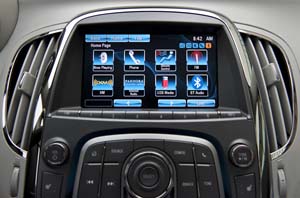
Consumers may demand connected vehicle tech -- like this Buick IntelliLink system - but it also worries them.
A new survey from the University of Michigan indicates that Americans by and large are nervous about whether new technology being used in more and more vehicles could be hacked and the data stolen.
The study follows revelations of how hackers stole millions of credit card numbers in a breach at Target – but was completed before word of the so-called Heartbleed security breech that has led to worries about even broader losses of data online.
A majority of Americans, Australians and Britons believe that so-called “connected-vehicle” technology will make driving safer, but most are also concerned about security and privacy, according to the Michigan survey.
Researchers Brandon Schoettle and Michael Sivak of the University of Michigan Transportation Research Institute, or UMTRI, polled 1,600 motorists about connected vehicles.
(Audi goes plug-n-play with upgradeable tech on new A3. Click Here to learn more.)
More than three-fourths believe that Internet connectivity in connected vehicles is important and approximately 86% are interested in having connected-vehicle technology.
However, 30% of the online respondents in the U.S., Australia and the U.K. also said they are “very concerned” about the potential for breaches in vehicle security by hackers and also worry about data privacy as the technology could allow the tracking of vehicle speed and location.
Another 37% of the respondents are “moderately concerned” about the same issues and nearly a quarter are “slightly concerned,” according to the survey results.
(Carmakers show off new connected vehicle tech. Click Here to check out some of the latest.)
The UMTRI survey results also echo many of the comments by Daimler AG shareholders during the company’s annual meeting in Berlin this week. The Daimler meeting is unique in that it also has a long tradition of forcing executives to address a broad range of issues.
Dieter Zetsche, chairman of the Daimler board of management and head of the Mercedes-Benz car group, told shareholders that Daimler was acutely aware of the problems related to data theft – but he insisted the company is taking every step it can to protect the privacy of its customers everywhere in the world.
Daimler’s answer to the threat included a heavy investment in security system and protection, he said.
Other automakers such Ford Motor Co also have said they are actively working on protecting the privacy of any motorist using its vehicles. Ford came under intense scrutiny, several months back, after its global marketing chief, Jim Farley, flippantly said during a speech at the annual Consumer Electronics Show that Ford’s technology can collect and store a broad array of data about its customers.
(Ford’s Farley apologizes over spy flap. Click Herefor the story.)
Independent studies done by the U.S. Department of Transportation have also indicated that automobiles are susceptible to hacking. The problem could grow more serious as manufacturers add more capabilities to their cars – including the ability to reprogram engine control systems to correct software problems.
Meanwhile, a growing number of makers, including General Motors and Hyundai, now offer remote start and remote door unlocking features that could become the target of hackers.
The UMTRI study said that in addition to security and privacy fears, a majority of the respondents also expressed concern about system failure and performance, especially during bad weather, and that drivers will rely too much on the technology or will be distracted by it.
Despite concerns about security and privacy, about three-fourths of respondents to the Michigan survey said that connected vehicles will reduce the number and severity of crashes, improve emergency response times and result in better fuel economy. In addition, more than 60% expect less traffic congestion, shorter travel times and lower vehicle emissions.
The researchers also found that 62% of the survey participants have a positive opinion about connected vehicles, while about a third are neutral. Perhaps surprisingly, only 27% of Americans, 22% of Australians and 17% of Britons have ever heard of the term connected-vehicle technology, they said.
More than 80% of respondents in all three countries indicate safety is the most important aspect of connected-vehicle technology, compared to mobility and environment. And roughly 80% say that integrating personal communication devices with vehicle technology is at least somewhat important.
Americans tend to have a lower overall opinion of connected vehicles, 57% saying they were positive about the technology, 7% negative – compared to Britons, who were 67% positive, and only 4% negative – and Australians, who were 63% positive and just 5% negative.

Everyone should be worried about connected vehicles. Perps have already compromised auto security systems and we’ve seen what these hackers can do to bank accounts and personal information. Be very careful what you ask for when it comes to being “connected” because you’re likely to get a lot more than you bargained for and it won’t be good.